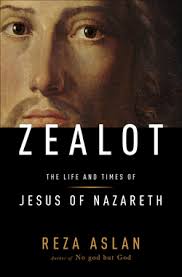The Uncertain Tone of the Book
Whittaker claims to have confidence in his thesis but even a quick survey of the book reveals the tenuous nature of the evidence he provides. It is pervaded with uncertainty and flights of fancy, possibilities and the need to suspend disbelief. We can compare the usage of words showing uncertainty with another recent and quite famous book purporting to show new truths about Jesus, 'Zealot' by Reza Aslan:
For Christ's Sake
233 instances of 'might'
187 instances of 'could'
151 instances of 'possible'
90 instances of 'secret'
77 instances of 'mystery'
66 instances of 'theory'
60 instances of 'probable'
38 instances of 'maybe'
38 instances of 'feel'
36 instances of 'assume'
34 instances of 'speculate'
16 instances of 'perhaps'
10 instances of 'suppose'
9 instances of "think we know"
Zealot
15 instances of 'might'
129 instances of 'could'
31 instances of 'possible'
41 instances of 'secret'
5 instances of 'mystery'
13 instances of 'theory'
18 instances of 'probable'
0 instances of 'maybe'
9 instances of 'feel'
24 instances of 'assume'
3 instances of 'speculate'
41 instances of 'perhaps'
8 instances of 'suppose'
0 instances of "think we know"

W. uses these words suggesting possibility rather than probability or certainty far more often than Aslan. Admittedly Aslan uses 'perhaps' much more than W. but overall W. uses 3 times as many words denoting uncertainty and possibility than Aslan does. He also uses the phrase "we have" 79 times. In most instances in the book this should read "I have" because he has no reason to believe the reader is accepting his very questionable statements.
This is a book in which the author, committed to the theory though he is, only has evidence that is contingent and speculative. A chain made of paper will carry no weight no matter how many links it has. Furthermore, in many cases, the language of the Bible must be redefined to fit his thesis. e.g. he redefines 'healing' and baptising to mean "initiating into secret techniques that produce an actual divine gnosis." W. displays an a priori principle of selective credulity at work in relation to the biblical and non-biblical texts. Those things he can suggest bear some witness to his ideas or can be redefined to his liking are accepted, those he can't, aren't.